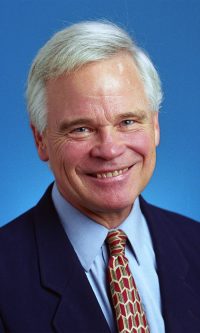DG MARTIN COLUMN: Who teaches us how to live — and die?
Alzheimer’s.
Just the word scares you to death, doesn’t it?

D.G. Martin
A little more than 10 years ago, I wrote a column about my experience with this disease and am sharing my thoughts with you again. I had just seen an article that described and gave examples of a new mental test that can make a very reliable preliminary diagnosis of early onset Alzheimer’s.
I read every word. I answered every question. I will tell you why in a minute.
My family has a long interest in this disease. It slowly robs its victims of the ability to remember and to reason. Then it takes their personalities and slowly steals their lives away.
My father was a victim. After his death, my mother spent the last part of her life comforting the families of victims, organizing support groups, and raising money to find the causes of Alzheimer’s.
But there is more to it, more that explains why any article about Alzheimer’s always stops me in my tracks.
More than 50 years ago my father, only 58 years old, learned he was afflicted with early onset Alzheimer’s. A successful president of Davidson College, widely admired and loved, he seemed happy with his work and ready for many years of additional service to his college and community.
It never seemed fair.
But, of course, the killer diseases that bring about premature death never seem fair.
Now, why did I try all the questions on that test that made the preliminary check for Alzheimer’s? Well, we all worry sometimes, don’t we? We worry about losing little bits of memory and wonder if perhaps, God forbid, it might be Alzheimer’s?
I worry, but then I think about my dad and it is more than worry.
I am now many years older than my dad was when he found out about his Alzheimer’s.
So I think about it a lot. It is not so much worrying about losing my memory. In fact, I did well on the test. Instead, I mourn the loss of what my father would have taught me had he been spared.
My father’s life was full of monuments for me. He showed me how to live and serve with grace and honor. His example was a good one, all the way until Alzheimer’s brought him down.
Now I ask myself, “Who teaches me how to live the rest of my life? Whose example do I follow now?”
I miss not knowing how he would have dealt with all the things life brings in late middle age and retirement years. Even now, when normal old age would almost certainly have brought about his death even if Alzheimer’s had not taken him so early, I miss most of all not having had the chance to watch and learn how he would have faced his normal aging and death.
You see, Alzheimer’s stole not just his life. It stole his ability to face death and deal with it.
I wish I could have had his example. I think it would have been a good one. But I will never know.
Meanwhile, I can watch and learn from others.
Former governor and senator Terry Sanford, for instance. When Sanford received a diagnosis of “inoperable cancer,” he turned it into a challenge to live to the fullest until his death in 1998. He figured out new ways to persuade people to support good causes. He seemed to be telling us, “I am going to live a lot longer than you might think, but however long it is, it is going to be good.”
And now, former president Jimmy Carter, even in Hospice care, continues to seek ways to help make life better for the rest of us.
I like those examples.
When the time comes, I hope I can follow them.
And, if I do, I know that my dad would be proud.
D.G. Martin, a retired lawyer, served as UNC-System’s vice president for public affairs and hosted PBS-NC’s “North Carolina Bookwatch.”

